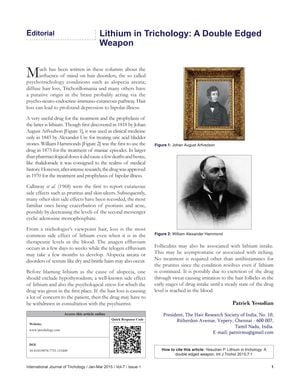Lithium in Trichology: A Double-Edged Weapon
January 2015
in “
International Journal of Trichology
”

TLDR Lithium can treat bipolar disorder but may cause hair loss and other hair problems.
The document discusses the role of lithium in trichology, highlighting its dual nature as both a treatment for bipolar disorder and a potential cause of hair-related side effects. Lithium, first discovered in 1818 and approved for bipolar treatment in 1970, has been associated with various cutaneous side effects, including exacerbation of psoriasis and acne. From a trichological perspective, the most common side effect is hair loss, which can manifest as anagen effluvium within days to weeks or telogen effluvium over a few months. Other hair issues such as alopecia areata and changes in hair texture may also occur. Before attributing hair loss to lithium, it is important to rule out hypothyroidism and the psychological stress that necessitated lithium use. If hair loss significantly concerns the patient, discontinuation of lithium may be considered in consultation with a psychiatrist. Additionally, lithium intake can cause folliculitis, which is usually asymptomatic or may cause itching but typically resolves without specific treatment other than antihistamines for pruritus.





